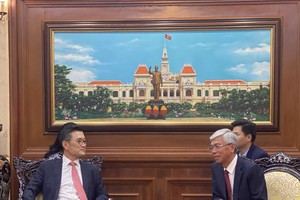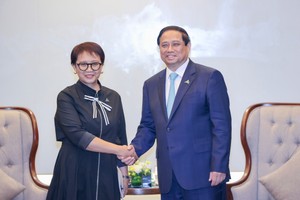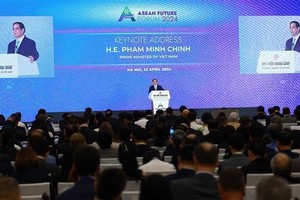With a controversial nuclear deal with the United States now in limbo, India held out the possibility Tuesday of civilian nuclear cooperation with China.

Indian Prime Minister Manmohan Singh, on the last day of a visit to China, said the world's two most populous nations -- who have a decades-long history of mistrust -- should work together to develop their nuclear energy programs.
"It is natural that major powers, bound together by economic interdependence, will seek to cooperate with each other to mutual benefit. India and China must be part of this cooperative framework," Singh said.
"India seeks international cooperation in the field of civilian nuclear energy, including with China," he said in a speech at the Chinese Academy of Social Sciences. He did not go into further detail.
Singh's visit, the first here by an Indian premier in five years, comes as the two rising Asian giants try to strengthen ties and put their history of animosity behind.
The prime minister made an appeal to what he called "the Asian way -- avoiding confrontation and building trust, confidence and consensus."
India has already agreed a deal for the United States to provide nuclear fuel and technology, but the deal has been on hold -- in part because of opposition inside Singh's own administration.
China has expressed reservations over the deal, citing concerns over the proliferation of nuclear materials.
Singh, who was to meet President Hu Jintao later in the day, noted that the two nations had agreed to set a target of 60 billion dollars in bilateral trade in 2010, up from nearly 40 billion dollars last year.
"We should harness our complementarities and synergies in the areas of trade and business," he said.
"India's growing consumer market, skilled human resources, and software excellence together with China's own large market, its manufacturing prowess and cost competitiveness provide the platform for exponential growth in our economic ties."
Singh and Chinese Premier Wen Jiabao on Monday signed a broad agreement that they said would push an often testy relationship to a new level of cooperation.
The pact pledges a renewed effort to solve a Himalayan border dispute over which they fought a brief war in 1962.
"Our prime minister has stated on a number of occasions that there is enough room for the rise of both India and China," said Nirupama Rao, India's ambassador to Beijing, according to the China Daily.
In the same paper, Hu Shisheng, a South Asia expert at the China Institute of Contemporary International Relations, said the China-India partnership was moving forward to becoming "a really global one".
"From Prime Minister Singh's talks with Chinese leaders, we can see a growing concern over global issues compared to previous high-level communication between the two sides," he said.
























